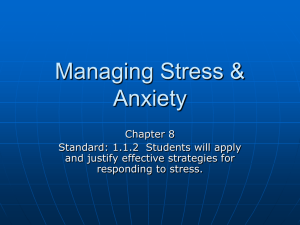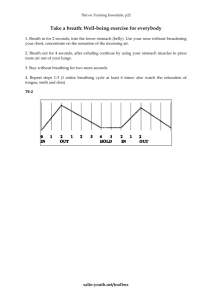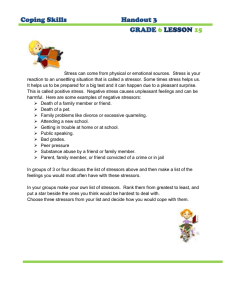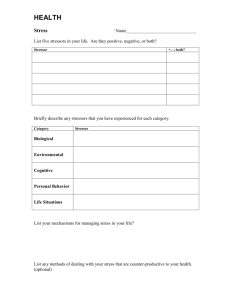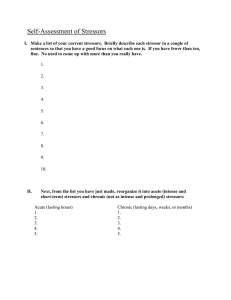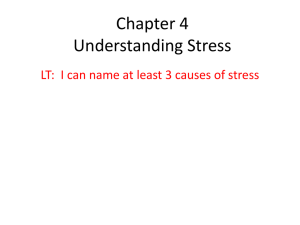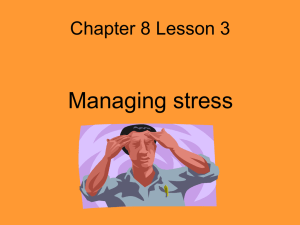Stress Management
advertisement
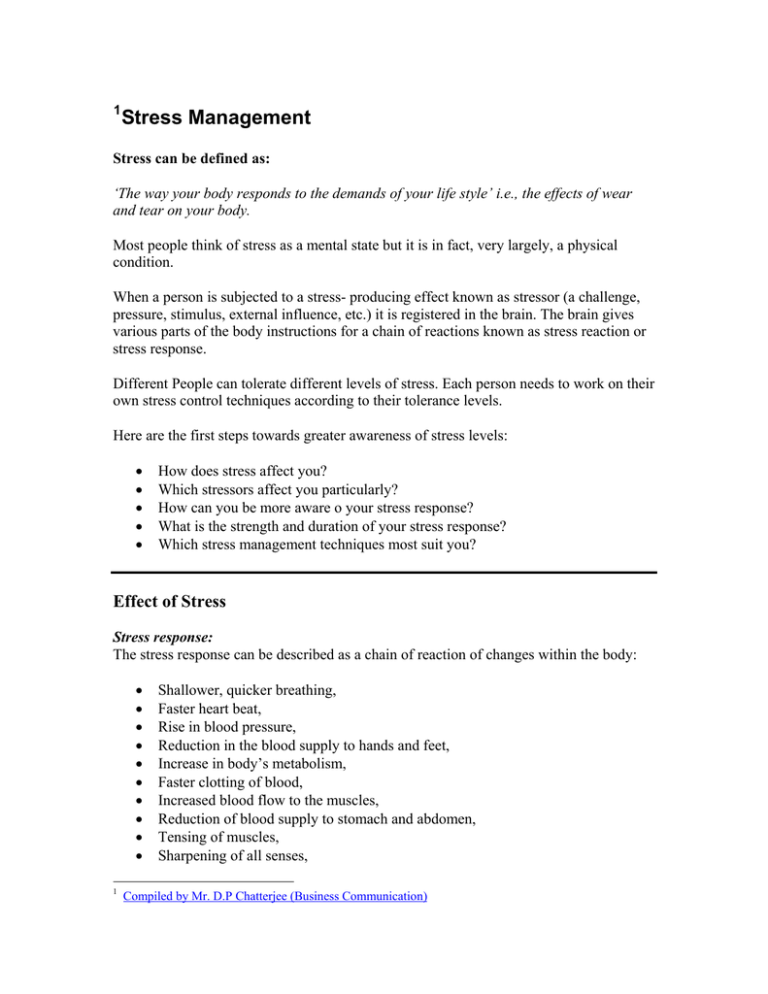
1 Stress Management Stress can be defined as: ‘The way your body responds to the demands of your life style’ i.e., the effects of wear and tear on your body. Most people think of stress as a mental state but it is in fact, very largely, a physical condition. When a person is subjected to a stress- producing effect known as stressor (a challenge, pressure, stimulus, external influence, etc.) it is registered in the brain. The brain gives various parts of the body instructions for a chain of reactions known as stress reaction or stress response. Different People can tolerate different levels of stress. Each person needs to work on their own stress control techniques according to their tolerance levels. Here are the first steps towards greater awareness of stress levels: • • • • • How does stress affect you? Which stressors affect you particularly? How can you be more aware o your stress response? What is the strength and duration of your stress response? Which stress management techniques most suit you? Effect of Stress Stress response: The stress response can be described as a chain of reaction of changes within the body: • • • • • • • • • • 1 Shallower, quicker breathing, Faster heart beat, Rise in blood pressure, Reduction in the blood supply to hands and feet, Increase in body’s metabolism, Faster clotting of blood, Increased blood flow to the muscles, Reduction of blood supply to stomach and abdomen, Tensing of muscles, Sharpening of all senses, Compiled by Mr. D.P Chatterjee (Business Communication) • • Reduction of tension in bowels and stomach functions, Reduction in the efficiency of the immune system. Of course all these changes in the body also have an effect on the brain and this can cause an alert mental state, leading to: • • • • • Faster activity of brain, Improvement of short term judgement, Faster decision making, Improved memory powers, Sharper focusing of the attention. Positive effects of stress: Stress is valuable under certain circumstances, e.g. sports, making speeches and taking examinations. The stress response puts people on their mettle, increase alertness, improves sight, strengthens muscles and reduces reaction times. The stress response increases our ability to stand and fight or turn and flee and to mobilize all our resources to achieve whatever we decide to do. Another positive is the zest that stress adds to life by stimulating the stress and the passions. Many people need challenge in their lives and would be unhappy without it. Stress only has a positive effect if it is not allowed to build up or feed on itself, i.e. if it can be worked off. Negative effects of stress: The negative effects of stress show particularly when a person allows stress to remain in the body, usually when a person allows stress to remain in the body, usually when there is no chance to take the necessary steps to release a stress response that is too strong or lasts too long. The negative effects of stress show up in three ways in particular: 1. Unsuitable behavior 2. Lower energy and performance levels 3. Poorer health Here are some examples of the negative effects of stress: 1. Unsuitable behavior • Loser behavior • • • • Short temper Bad smoking, eating and drinking habits More frequent mistakes Less flexibility 2. Lower energy and performance levels • Reduced concentration • Increased forgetfulness • Poor judgement • Prone to feeling of tiredness 3. Poorer to health • Heart and circulatory diseases • Ulcers • Infectious diseases • Skin diseases Stressors: The first step in learning to control your stress, and live with it, is to find out what your stresses are, i.e. what stresses you personally. Stressors are divided into physical and social groupings and the social stresses can be subdivided into further: Physical stressors Example: • Heat, Fire, Traffic, Violence, Own Illness, • Cold, • Noise, • Poor working conditions and equipment. Social Stressors There are four main causes of social stress: Social, economic and political • Unemployment • Inflation • Cost of housing • Taxes • Crime • Pollution • Technological change Family • Sharing of workload • Jealousy • Sex roles • Different values • Death or illness in the family • Different lifestyle, • Money problems. Job and career. • Deadlines • Muddled communication • Traveling time • Interruptions • Competition • Power struggles • Education/Training Interpersonal and environmental. • Different values • Obligations • Waiting time • Poor service • Smokers/Non-smokers • Driving habits • Social expectations Stress Signals ( Do not treat the symptoms, treat the cause) Examples of stress signals: 1. Physical • Changes in breathing rhythm • Tense and aching muscles • Headaches • Sweating • Cold hands and feets • Changes in appetite • Stomach problems, heartburn 2. Mental • Lack of concentration • More frequent mistakes • Forgetfulness/ Absentmindedness • Tendency to over-react • Poorer judgement 3. Emotional • Irritation / Short Temper • Nervousness • Depression/Silence • Emotional outbursts/Crying 4. Behavioral • Insomnia • Increased drinking and smoking • Absenteeism • Clumsiness Ways of managing Stress: 1. Awareness of stress 2. Analysis and treatment of the actual stressor (i) Take action (ii) Withdraw (iii) Do Nothing (iv) Adjust your attitude 3. Physical Fitness 4. A healthy diet 5. Relaxation 6. Take short rest breaks during the day 7. Breathing: Take five completely relaxed breaths feeling your stomach moving and your stomach muscles relaxing. Breath1: Breathe in deeply and out again fully. For the next four breaths tense a group of muscles as you breathe in and relax them as you breathe out. Breath 2: Feet, Breath 3. Hands and upper part of body, Breath 4: Jaw, Breath 5: Stomach.
